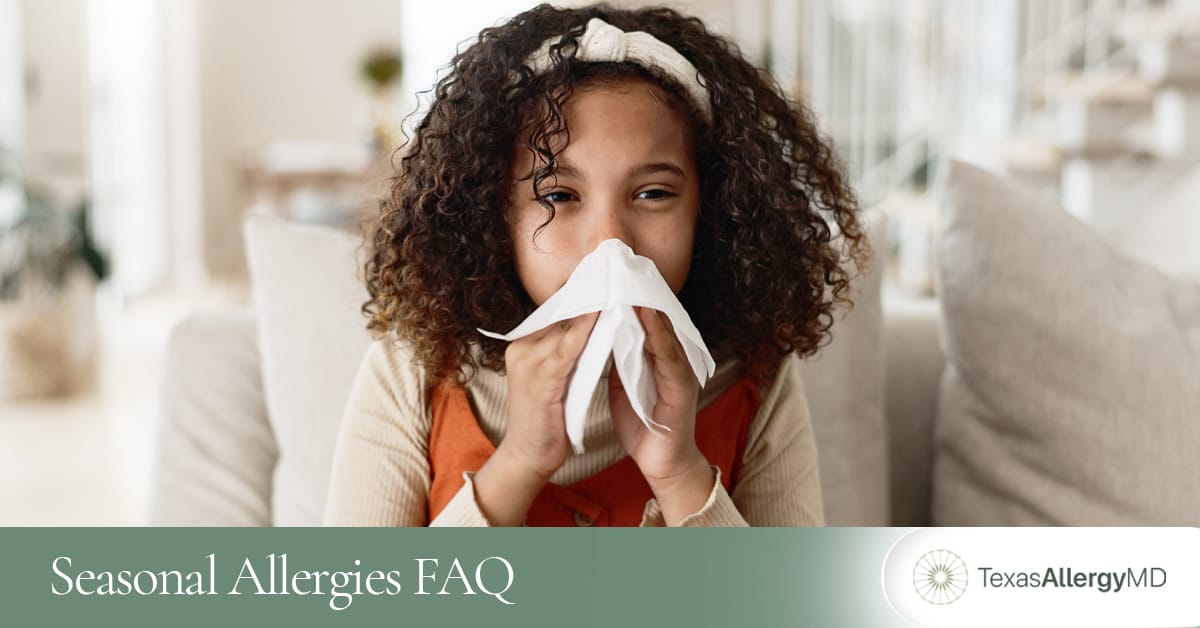The Most Common Questions & Answers About Seasonal Allergies

What Are the Most Common Questions About Seasonal Allergies?
Seasonal allergies can cause discomfort and inhibit personal activities. This results in common questions about what they are and what to do about them. Seasonal allergies have symptom profiles that are similar to regular allergies, and are caused by the same immune system confusion that misidentifies a substance or material as something to be attacked.
But as the name suggests, seasonal allergies coincide with substances present in the air at a specific time of year. And as there are similarities between colds and seasonal allergies, it’s important to seek allergy testing to receive the proper diagnosis and treatment. Below are the answers to common questions we’ve fielded from patients about seasonal allergies.
What are the symptoms of seasonal allergies?
Symptoms of seasonal allergies include (but are not limited to) red, watery eyes, stuffy or runny nose and congestion, headaches with significant pressure, coughing, itchy eyes, nose or throat, and excess mucus.
Do seasonal allergies cause a sore throat?
Seasonal allergies cause the throat to feel sore due to post nasal drip, which occurs when excess mucus drips into the back of the throat, causing irritation, itchiness and pain.
Can seasonal allergies cause headaches or migraines?
Yes, seasonal allergies often present with headaches featuring incredible pressure and pain in the sinus area specifically. For those who are prone to migraines, allergies can even trigger an episode.
What pollen causes seasonal allergies in spring?
Tree pollens usually cause seasonal allergy symptoms to flare up in springtime. Major offenders include ash, birch, cedar, maple and oak. Powerful cedar symptoms are often called “cedar fever.”
What are the worst months for seasonal allergies?
The worst months for seasonal allergies vary based on where someone lives, and what they are allergic to. Allergy season starts at varied times based on the blooming time of regional flora.
Do seasonal allergies get worse at night?
Seasonal allergies may feel worse at night, especially with congestion or postnasal drip, since some pollens peak overnight & early morning. Pet dander may also trigger nighttime flare-ups.
What is the best way to treat seasonal allergies?
The best way to treat seasonal allergies is to visit a board-certified allergist for comprehensive testing and allergy treatment. Thorough testing identifies triggers and leads to personalized treatment options.
Can nasal sprays help treat allergies?
Used under the care of an allergist, specialized nasal sprays are one of the best treatments for seasonal allergies. There are multiple types of nasal sprays and some have very limited use.
Do allergy shots work for treating seasonal allergies?
Using allergy shots, or subcutaneous immunotherapy (SCIT), is one of the original treatments for seasonal allergy relief. A form of exposure therapy, it builds tolerance to the allergen over time.
Can you treat seasonal allergies with sublingual immunotherapy?
Yes, you can treat seasonal allergies with sublingual immunotherapy (SLIT). This innovative treatment is a convenient way to overcome allergy symptoms by desensitization. Allergy drops are administered daily under the tongue by the patient (or parent) versus in-office.
Find Expert Help for Your Seasonal Allergies Today
TexasAllergyMD provides innovative treatments for seasonal allergies and asthma at our treatment centers. Dr. Mireku works with each patient on a customized allergy treatment plan tailored to fit their lifestyle. Call us today at (469) 375-1525 or request an appointment.
A New Standard in Allergy Treatment & Care
Ask Us a Question
Achieve Lasting Relief From Allergies
Allergies
We identify the root cause of your allergy and provide practical solutions for a more comfortable life.
Food Allergies
Food allergy specialist Dr. Mireku helps you live life to the fullest with caring, patient-focused care.
Allergy Testing
Understand your actual allergy triggers with precision allergy testing at our allergy treatment centers.
Allergy Treatment Options
Allergy relief starts with our holistic allergy care and innovative desensitization treatments.











